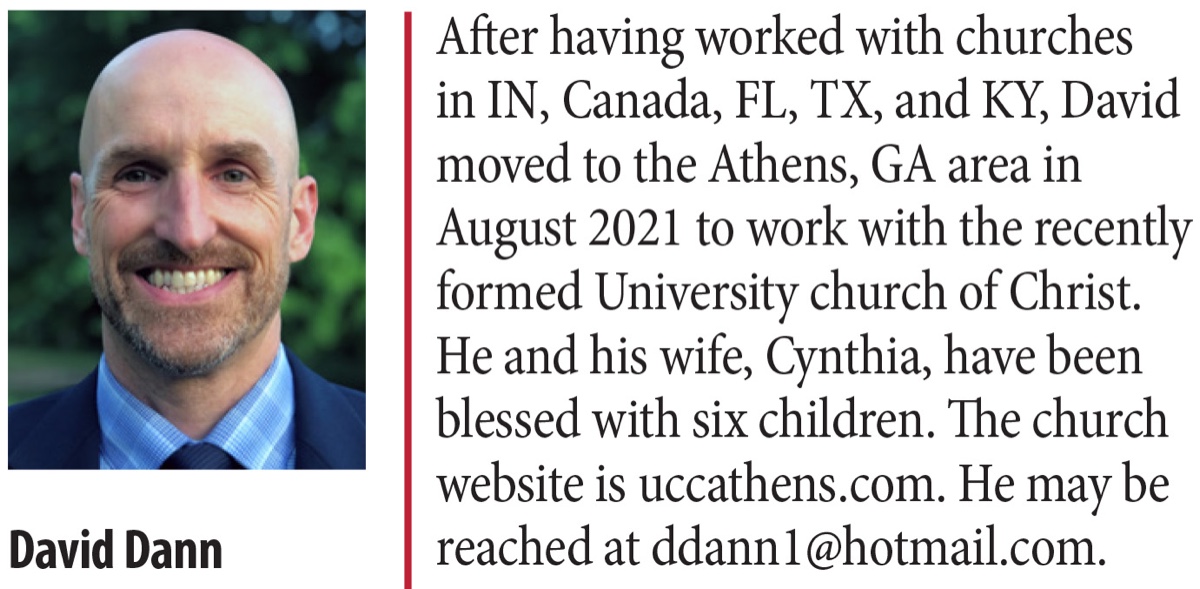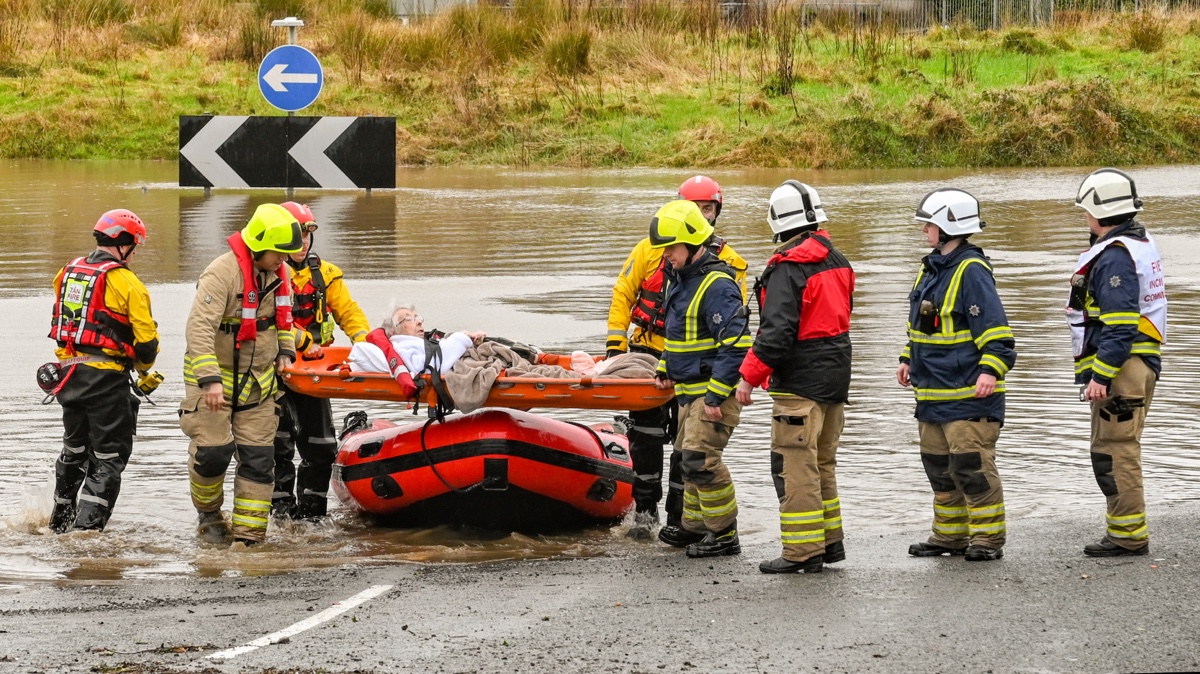By David Dann
Synopsis: Let us make it our aim to meet face to face with those who are perishing so that we can lead them to salvation in Christ.
Jesus came to rescue the perishing. “For God so loved the world that He gave His only begotten Son, that whoever believes in Him should not perish but have everlasting life” (John 3:16). Without Jesus, people would spiritually perish. Yet, through faith in Him, the perishing can be rescued and given everlasting life. Instead of instructing His disciples to withdraw from interaction with the outside world or attempt to influence the lost from afar, the Lord commanded His disciples to “go” in order to rescue the perishing among all nations (Matt. 28:19-20).
The message of the cross must be delivered in order for the perishing to be rescued. Paul writes, “For the message of the cross is foolishness to those who are perishing, but to us who are being saved it is the power of God” (1 Cor. 1:18). To rescue the perishing, those who have the message of salvation will have to come face to face with those who need it. In our present age of mass media and advanced digital technology, we may engage in Bible study with others from a distance through Zoom, Skype, phone, e-mail, and text messages, as well as through the sharing of sermon audio recordings, instructional videos, and articles on various Bible subjects. While these tools are often useful in our efforts to reach the lost, the perishing are ultimately rescued when God’s people are present to interact with them face to face.
Those who practice sin are cut off from fellowship with God and are bound for eternal destruction (cf. Isa. 59:1-2; Gal. 5:21). Since all capable individuals have personally sinned against God by violating His law, the world is populated primarily by people who are perishing (Rom. 3:23).
What can be done to deter these perishing people from spending eternity in the lake of fire (Rev. 21:8)? Paul writes, “For I am not ashamed of the gospel of Christ, for it is the power of God to salvation for everyone who believes, for the Jew first and also for the Greek” (Rom. 1:16). The gospel message of Jesus Christ is the only solution powerful enough to rescue the perishing from the fires of hell. However, in order for the gospel to work on the hearts of the lost, someone must be willing to communicate the message directly to those who need it (Rom. 10:13-17). God’s people are responsible for communicating face to face with those who are perishing in order to help deliver them from destruction.
Jesus personally interacted with the lost in order to give them the words of eternal life. The Lord engaged in a face-to-face conversation with Nicodemus so that He could inform him of his need to be born again (John 3:1-5). He spoke face to face with a woman at a well so that He could offer her living water (John 4:1-26). In fact, He was criticized for meeting the tax collectors and sinners whom He sought to save (Luke 15:1-2). The example set by Jesus is one of personal, face-to-face interactions with sinners in order to rescue the perishing.
Christ’s followers also personally interacted with people in order to teach them the way of salvation. Philip “preached Jesus” during a face to face encounter with the Ethiopian, resulting in his obedience to the gospel (Acts 8:35-38). Peter personally “went in and found many who had come together” at the house of Cornelius and taught them the gospel (Acts 10:27). Paul met with Felix face to face and “reasoned about righteousness, self-control, and the judgment to come” (Acts 24:25). The example set by first-century disciples is one of personal, face-to-face interactions with sinners in order to rescue the perishing.
Targeted mailings, websites filled with teaching materials, e-mail and text exchanges, correspondence courses, Zoom sessions, and other interactions from a distance have their place as efforts are put forth to reach the lost. Yet, those methods are simply tools to use in working toward the goal of sitting down face to face with those who are lost in sin. Like Philip, we must invite the lost to “come and see” what the Lord offers to those who are perishing (John 1:46). Teaching the gospel remotely is no real substitute for engaging in a face-to-face meeting between the one who is perishing and the one who can show him, from the Scriptures, the way of salvation. Whatever methods we employ in reaching out to the lost, the goal must always be to engage them in a face-to-face presentation of the gospel.
John concluded his second letter, saying, “Having many things to write to you, I did not wish to do so with paper and ink; but I hope to come to you and speak face to face, that our joy may be full” (2 John 12). While “paper and ink” and other remote methods may be all that can be employed at times, speaking face to face is to be preferred. Direct interaction involves personal investments and sacrifices of time, energy, and focus that far outweigh any attempt to teach the gospel from a distance. Meeting in person to sit down face to face with a lost soul demonstrates a compassionate commitment to communicate the way of salvation to the one in need of it. Face-to-face efforts to rescue the perishing are meaningful in ways that other efforts cannot duplicate.
When Paul and Silas met with the Philippian jailer, the Bible says, “Then they spoke the word of the Lord to him and to all who were in his house. And he took them the same hour of the night and washed their stripes. And immediately he and all his family were baptized” (Acts 16:32-33). The gospel of Christ demands a response from those who hear it. Someone had to be present in order to baptize the jailer and his family when their hearts were convicted by the truth. There may be moments when Zoom, FaceTime, phone, or e-mail are all that are available to us as we seek to rescue a perishing soul. Eventually, someone will need to meet face to face with the one who is deciding to follow Jesus in order to hear his confession of faith in Christ and to baptize him for the remission of his sins (cf. Rom. 10:9-10; Acts 2:38). A loving hug, a pat on the back, and a shoulder on which to cry are only available in situations where we meet face to face. No matter how our interaction with the lost begins, it must conclude with a face-to-face meeting if those who are perishing are truly going to be rescued.
To rescue the perishing is to engage in the greatest and most urgent work in this world. Jesus said, “I say to you that likewise there will be more joy in heaven over one sinner who repents than over ninety-nine just persons who need no repentance” (Luke 15:7). Do you see how needed and important it is for us to reach out to those who are perishing so that we can show them the way of salvation? If so, then won’t you follow the example of Jesus and His disciples and make it your goal to meet face to face with a lost soul who needs to hear the message of the cross?


